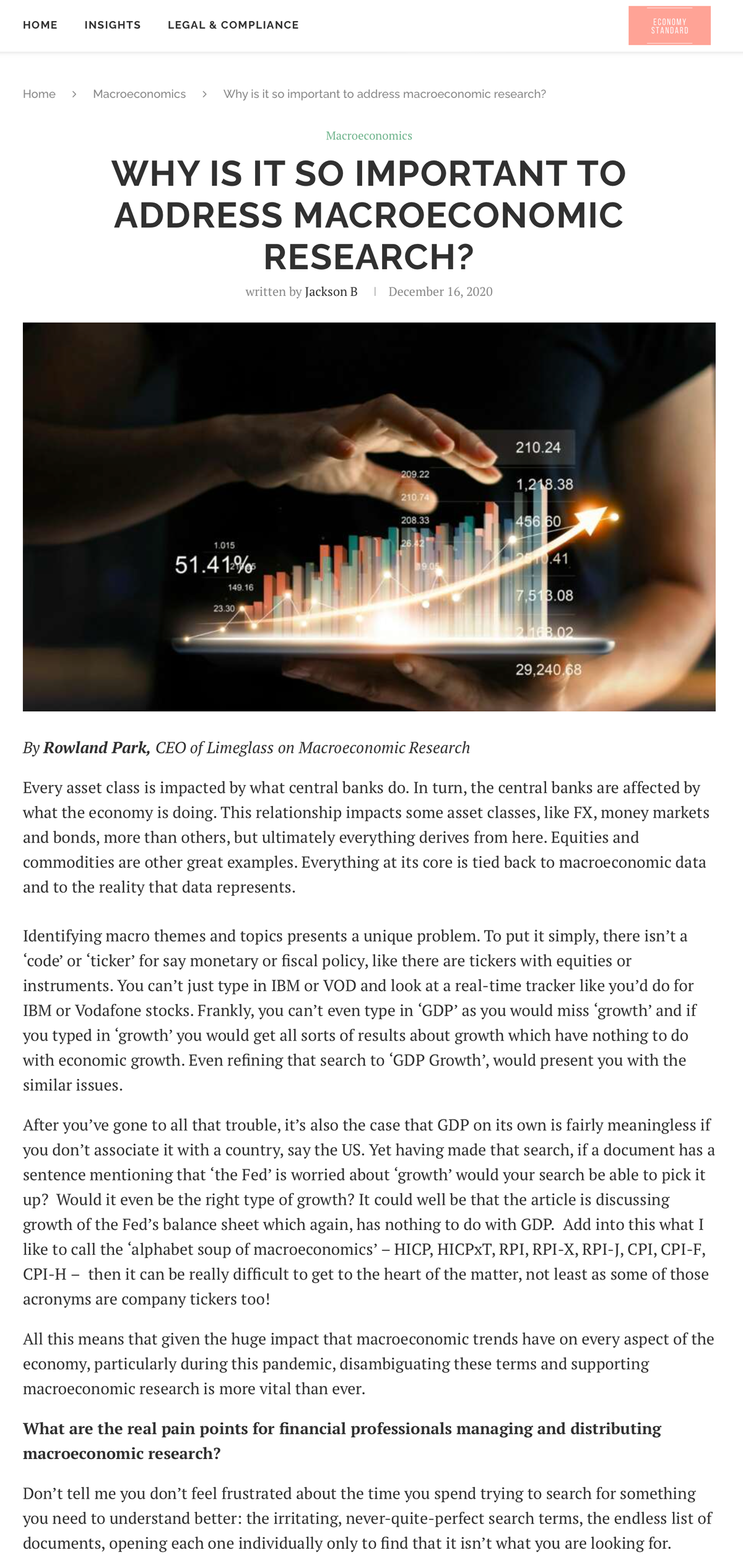Why is it so important to address macroeconomic research?
Every asset class is impacted by what central banks do. In turn, the central banks are affected by what the economy is doing. This relationship impacts some asset classes, like FX, money markets and bonds, more than others, but ultimately everything derives from here. Equities and commodities are other great examples. Everything at its core is tied back to macroeconomic data and to the reality that data represents.
Identifying macro themes and topics presents a unique problem. To put it simply, there isn’t a ‘code’ or ‘ticker’ for say monetary or fiscal policy, like there are tickers with equities or instruments. You can’t just type in IBM or VOD and look at a real-time tracker like you’d do for IBM or Vodafone stocks. Frankly, you can’t even type in ‘GDP’ as you would miss ‘growth’ and if you typed in ‘growth’ you would get all sorts of results about growth which have nothing to do with economic growth. Even refining that search to ‘GDP Growth’, would present you with the similar issues.
After you’ve gone to all that trouble, it’s also the case that GDP on its own is fairly meaningless if you don’t associate it with a country, say the US. Yet having made that search, if a document has a sentence mentioning that ‘the Fed’ is worried about ‘growth’ would your search be able to pick it up? Would it even be the right type of growth? It could well be that the article is discussing growth of the Fed’s balance sheet which again, has nothing to do with GDP. Add into this what I like to call the ‘alphabet soup of macroeconomics’ – HICP, HICPxT, RPI, RPI-X, RPI-J, CPI, CPI-F, CPI-H – then it can be really difficult to get to the heart of the matter, not least as some of those acronyms are company tickers too!
All this means that given the huge impact that macroeconomic trends have on every aspect of the economy, particularly during this pandemic, disambiguating these terms and supporting macroeconomic research is more vital than ever.
What are the real pain points for financial professionals managing and distributing macroeconomic research?
Don’t tell me you don’t feel frustrated about the time you spend trying to search for something you need to understand better: the irritating, never-quite-perfect search terms, the endless list of documents, opening each one individually only to find that it isn’t what you are looking for.
We stop the pain you experience whenever you’re trying to find the information you need.
Imagine a future where you could type in just one search term to immediately have all of the most relevant information at your fingertips and imagine having that on your desktop tomorrow. What we offer really is that simple.
Our goal is to provide relevant and timely information on something that will affect any instrument by helping you to understand the thinking of a central bank or of other market participants. We want to give you a head-start in anticipating that thinking, in being a step-ahead of a market move and ultimately in understanding topics better and faster, saving you huge amounts of time. Limeglass offers a number of different tools within its software to do just that, but two that are worth highlighting are: Rich NLP and Synonyms.
What is Rich NLP, and how does it help with macroeconomic research?
Macroeconomic documents tend to be based around multiple geographies, if you are trying to use traditional techniques to analyse these documents then all the software is typically basing its deductions on is, put simply, the proximity of words to one another. However, if the country is derived from a sub-title or inferred by the discussion of a specific topic like former-Supreme Court Justice Ginsburg, then that system doesn’t work. We have designed a form of Rich NLP which is capable of identifying the flow of the article, titles, subtitles, styles and formatting in a manner closer to how a human would read it, to smart tag all the way down to paragraph level. This provides much more accurate results, saving the reader time, enhancing their research with accurate and appropriate linkages to other documents.
Seeing more than one document at once, by picking out these relevant paragraphs, seems like a simple innovation but it enables people to understand the macroeconomic landscape of any country, supports them in building a fuller picture from which to make a decision and enables them to do so much faster and much more efficiently.
How can technology understand Synonyms?
Given the complexity of macroeconomic discussion and its international nature, many different terms are used to describe similar things. We think it’s critical to pay such close attention to synonyms. If you search ‘US-China trade war’ you need to see results for trade tension, trade spat, protectionism, anti-dumping measures, minimum import prices and tariffs – just to name a few! You also need to avoid anything to do with the word ‘trade’ when it refers to an investment decision as opposed to the exchange of goods and services between the US and China. The synonyms are a vital part of our proprietary Rich NLP, which doesn’t rely exclusively on crude techniques such as stemming as other solutions tend to do.
The macroeconomic agenda is news-driven. How can technology help market participants to react?
One good recent example is the resignation of Shinzo Abe as Japanese Prime Minister. We’ve designed our technology so market participants can rapidly familiarise themselves with the political situation in Japan, likely successors to Abe, and the impact that their policy preferences would have on macroeconomic trends. ‘Suganomics’ was just one of those synonyms that helped identify key material.
But, that’s ultimately reactive. If you were proactively looking to develop a strategy around APAC investments, you need to ensure you aren’t missing key information, through its taxonomy, ontology and contextual awareness. You need the technology and tools to highlight what is being written about and provide you with a tool to find different terms for the same thing, different anglicisations, and ensure you are well-versed on Malaysian monetary policy before taking that Malaysian position.
We need to go beyond specific asset-class expertise to focus on entire geographies and macroeconomic trends.
News & Insights
Rowland Park
CEO & Co-Founder






